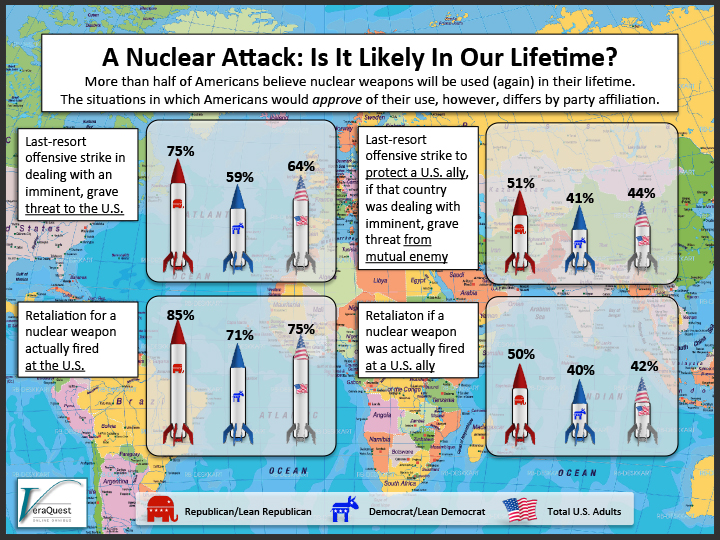Despite watching a ton of post-apocalyptic movies like the Mad Max series and The Day After, the idea of a nuclear attack is an abstract concept for someone like me who was too young to personally remember actual events like the Cuban Missile Crisis when Russia and the U.S. came perilously close to thermo-nuclear war. And while my brothers, 12 and 14 at the time, practiced “duck and cover” drills at school, the threat was scary but still relatively abstract. However, to many in Japan, a nuclear attack remains an extremely tangible phenomenon as the physical and psychological scars endure as part of the national psyche. Given the consequences of a nuclear event, we thought it might be relevant to see what Americans think, particularly in the context of the current political climate.
In a nationwide survey conducted between September 14 and September 18, 2016, we asked 3,000 Americans whether they thought a nuclear weapon would be used (again) in their lifetime. Disturbingly, more than half (54%) said “yes”. Millennials had the highest rate of affirmative responses (56%) compared to 48% for the Silent/Greatest Generations. However, I suspect the generational disparity may be more a reflection of anticipated life-expectancy than of any inherent level of fear.
Looking at the same data through a political lens, those who identify as Republican or Lean Republican are significantly more likely to say “yes”, a nuclear attack is likely to occur in their lifetime (58%) than those who identify as Democrat or Lean Democrat (52%). The gap here may speak to a fundamental contrast in the underlying state of mind (i.e., fear and anxiety about the future of the country) between Americans who identify with one party or the other. We also found that more people from the mid-west/south (57%) believe it is likely that nuclear weapons will be used during our lifetime versus those who are from the east/west (50%), which is not surprising given how strongly aligned those regions are with party affiliation.
I find it compelling that three-quarters (75%) of Republicans or those who Lean Republican would approve of an offensive nuclear strike if the U.S. was dealing with an imminent, large scale threat, compared to 59% of Democrats or those who Lean Democrat. This is in no-way a critical assessment of those on the right, given that the majority of those on the left agree with them. I do, however, find the magnitude of the difference on this question (16 percentage points) to be significant…and not just from a statistical perspective but as a defining characteristic between the constituencies of each party.
As a country, we (understandably) focus much of our attention on relatively smaller scale attacks, probably due the frequency and seemingly randomness with which they occur. Meanwhile, the majority of Americans believe that the “unthinkable” is actually likely. I find that fact to be a terribly sobering aspect of what we carry around in our psychological briefcase every day.
Do you think that a non-accidental nuclear event is likely in your lifetime? Under what circumstances would you find it justifiable for the U.S. to launch a nuclear attack again?

Leave a Reply